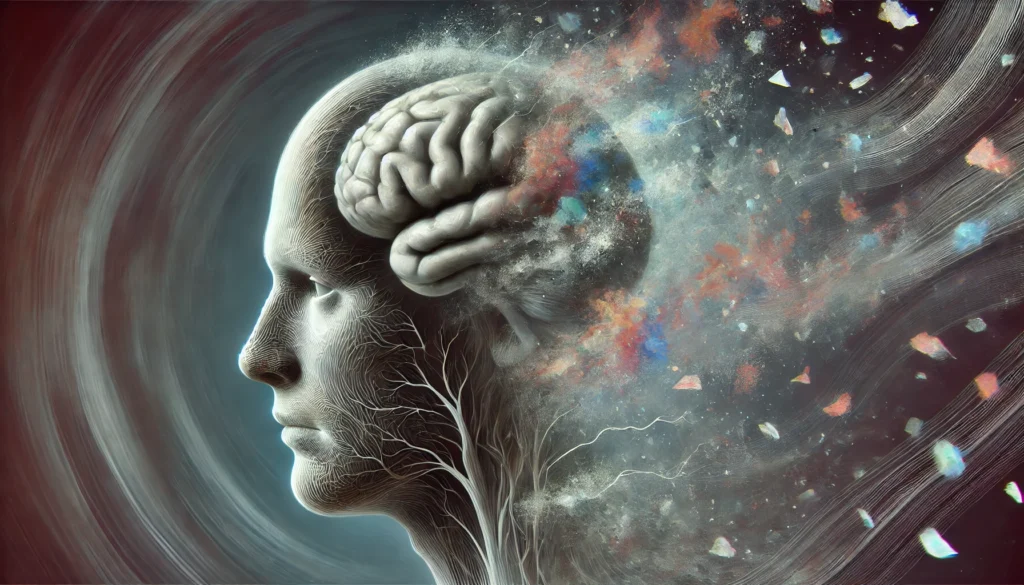Trauma, in its broadest sense, refers to an experience that is deeply distressing or disturbing. It can manifest as physical trauma, such as a head injury, or psychological trauma, such as the emotional aftermath of a violent event. The consequences of trauma can be long-lasting, impacting both mental and physical health.
You may also like: Tips to Improve Low Average Memory Performance
Defining Trauma
Trauma is often defined by its intensity and the impact it has on an individual’s ability to cope. Acute trauma results from a single incident, while chronic trauma is repeated and prolonged. Complex trauma refers to exposure to varied and multiple traumatic events, often of an invasive, interpersonal nature. Each type can impact the brain in unique ways, potentially influencing the risk of developing dementia.
Physical Trauma
Physical trauma encompasses injuries to the body that can have severe repercussions on brain health. This includes traumatic brain injuries (TBIs) commonly resulting from accidents, falls, or sports injuries. Such injuries can lead to immediate and delayed effects on cognitive function, sometimes precipitating conditions like dementia.
Psychological Trauma
Psychological trauma arises from events that threaten an individual’s sense of security and well-being. Experiences like emotional abuse, military combat, or witnessing a traumatic event can have profound impacts on brain function. The stress and anxiety stemming from such experiences can alter brain chemistry and structure, potentially increasing dementia risk.
Dementia: An Overview
Dementia is a general term that signifies a decline in cognitive function severe enough to interfere with daily life. It is not a single disease but a syndrome encompassing a range of symptoms, including memory loss, confusion, and personality changes.
Types of Dementia
Dementia comprises several types, each with distinct characteristics and progression. Alzheimer’s disease, the most common form, involves plaques and tangles in the brain. Vascular dementia results from blood flow issues in the brain. Other types include Lewy body dementia and frontotemporal dementia, each with unique symptoms and causes.
Symptoms of Dementia
The symptoms of dementia vary depending on the type and stage of the condition. Common early signs include memory loss, difficulty concentrating, and challenges with problem-solving. As dementia progresses, symptoms can include significant memory impairment, confusion about time and place, and changes in behavior and mood.
Risk Factors for Dementia
While age is the most significant risk factor for dementia, other elements such as genetics, lifestyle, and environmental influences play critical roles. Understanding how trauma fits into this picture is essential for developing comprehensive prevention and treatment strategies, as trauma may act as a modifiable risk factor.
Can Trauma Cause Dementia?
The question of whether trauma can directly cause dementia is complex and multifaceted. Current research suggests that trauma, particularly traumatic brain injuries, might increase the risk of developing dementia later in life. However, this relationship is not straightforward and involves multiple interacting factors.

Traumatic Brain Injury (TBI) and Dementia
A growing body of evidence indicates that TBIs, especially those resulting in loss of consciousness, can elevate the risk of dementia. The physical damage to brain tissue, coupled with the body’s inflammatory response, can lead to chronic neurodegeneration. Studies show that repeated TBIs, such as those experienced by athletes, can significantly increase the risk of conditions like chronic traumatic encephalopathy (CTE) and Alzheimer’s disease.
Psychological Trauma and Dementia
Psychological trauma, such as that experienced during wartime or severe stress, may also be linked to an increased risk of dementia. Chronic stress can lead to changes in brain structure and function, potentially contributing to cognitive decline. Research indicates that prolonged exposure to stress hormones can damage areas of the brain responsible for memory and learning.
The Role of Stress and Resilience
The impact of trauma on dementia risk may also depend on individual factors such as resilience and coping mechanisms. Those with strong social support networks and effective coping strategies may be less susceptible to the cognitive effects of trauma. Understanding these protective factors can inform interventions aimed at reducing dementia risk in trauma-exposed populations.
Brain Damage and Dementia: The Biological Pathways
Understanding the biological pathways through which trauma influences dementia is key to developing effective interventions. Several mechanisms are currently being studied to elucidate this complex relationship.
Inflammation and its Effects
After a traumatic event, the body’s response often includes inflammation, a protective measure intended to heal damaged tissue. However, when inflammation becomes chronic, it can harm brain cells and accelerate neurodegenerative processes, contributing to the onset of dementia. Research is focused on identifying anti-inflammatory strategies that could mitigate these effects.
Neurodegeneration Processes
Trauma can initiate neurodegeneration, characterized by a progressive loss of neuron structure or function. This process is central to many dementia types, including Alzheimer’s disease. Understanding how trauma triggers neurodegeneration can lead to targeted therapies that slow or prevent cognitive decline.
Hormonal Changes and Dementia
Trauma can alter hormonal levels, particularly stress hormones like cortisol. Elevated cortisol levels over extended periods can damage the hippocampus, a brain region crucial for memory and learning. Research is ongoing to explore interventions that regulate stress hormone levels to protect cognitive function.
Genetic and Epigenetic Factors
Genetic predispositions may influence how trauma impacts dementia risk, with certain gene variants potentially increasing susceptibility. Epigenetic changes, which involve modifications in gene expression without altering the DNA sequence, can also occur in response to trauma. These changes may affect brain function and increase dementia risk, highlighting the need for personalized approaches to prevention and treatment.
Practical Advice for Health Professionals
For health and wellness coaches, science journalists, and biohackers, understanding the links between trauma and dementia can inform practice and reporting. Here are some practical steps to consider in addressing these complex issues.
Monitoring and Early Intervention
Regular cognitive assessments for individuals who have experienced significant trauma can aid in the early detection of cognitive decline. Early intervention strategies, including cognitive training and lifestyle modifications, can be implemented to slow progression and improve quality of life.
Lifestyle Modifications to Mitigate Risk
Encouraging a healthy lifestyle is crucial in mitigating some risks associated with trauma. A balanced diet rich in antioxidants, regular physical activity, and stress-reduction techniques such as mindfulness and meditation can support brain health and reduce dementia risk.
Continued Research and Education
Staying informed about the latest research in trauma and dementia is essential for health professionals. This includes developments in neuroimaging, biomarkers, and therapeutic interventions. Education and training programs can equip professionals with the knowledge needed to implement evidence-based practices in their work.
Collaborative Care Approaches
Integrating care approaches that involve collaboration between neurologists, psychologists, and other healthcare providers can enhance outcomes for individuals at risk of trauma-induced cognitive decline. Multidisciplinary teams can provide comprehensive care that addresses the diverse needs of patients, from mental health support to cognitive rehabilitation.

The Future of Trauma and Dementia Research
The field of trauma and dementia research is rapidly evolving, with future studies poised to explore the intricate relationships between different types of trauma and the various forms of dementia. Innovations in medical imaging and genetics may offer deeper insights into these connections, paving the way for new prevention and treatment strategies.
Advances in Medical Imaging
Emerging imaging technologies, such as advanced MRI and PET scans, are improving our ability to visualize brain changes associated with trauma and dementia. These tools can help identify early biomarkers of cognitive decline, enabling timely interventions that may delay or prevent dementia onset.
Genetic Research and Personalized Medicine
Genetic research is uncovering how individual differences in DNA can influence the risk and progression of dementia following trauma. This knowledge can lead to personalized medicine approaches that tailor prevention and treatment strategies to an individual’s genetic profile, potentially improving outcomes.
Ethical and Social Implications
As research progresses, ethical considerations, such as consent and access to care, will become increasingly important. Addressing these issues is vital to ensure that advancements benefit all segments of the population. Equitable access to diagnostic tools and therapies, regardless of socioeconomic status, must be prioritized to prevent disparities in care.

Conclusion
The relationship between trauma and dementia is complex, involving a myriad of biological, psychological, and social factors. While significant progress has been made in understanding this connection, continued research is essential to fully unravel it and develop effective prevention and treatment strategies. By staying informed and proactive, health professionals can play a crucial role in supporting individuals at risk and mitigating the impact of trauma on brain health.
In summary, while trauma may not directly cause dementia, it is a significant risk factor that warrants attention and action. Through comprehensive understanding and strategic intervention, we can better address the challenges posed by trauma-induced cognitive decline, ultimately improving outcomes for affected individuals and reducing the global burden of dementia.
Further Reading:
Head Injury 25 Years Later – Penn Study Finds Increased Risk of Dementia
The 27 Stressful Life Events That Can Lead to Alzheimer’s
Experiencing Trauma In Childhood Linked To Increased Risk Of Developing Dementia
Important Note: The information contained in this article is for general informational purposes only, and should not be construed as health or medical advice, nor is it intended to diagnose, prevent, treat, or cure any disease or health condition. Before embarking on any diet, fitness regimen, or program of nutritional supplementation, it is advisable to consult your healthcare professional in order to determine its safety and probable efficacy in terms of your individual state of health.
Regarding Nutritional Supplements Or Other Non-Prescription Health Products: If any nutritional supplements or other non-prescription health products are mentioned in the foregoing article, any claims or statements made about them have not been evaluated by the U.S. Food and Drug Administration, and such nutritional supplements or other health products are not intended to diagnose, treat, cure, or prevent any disease.


